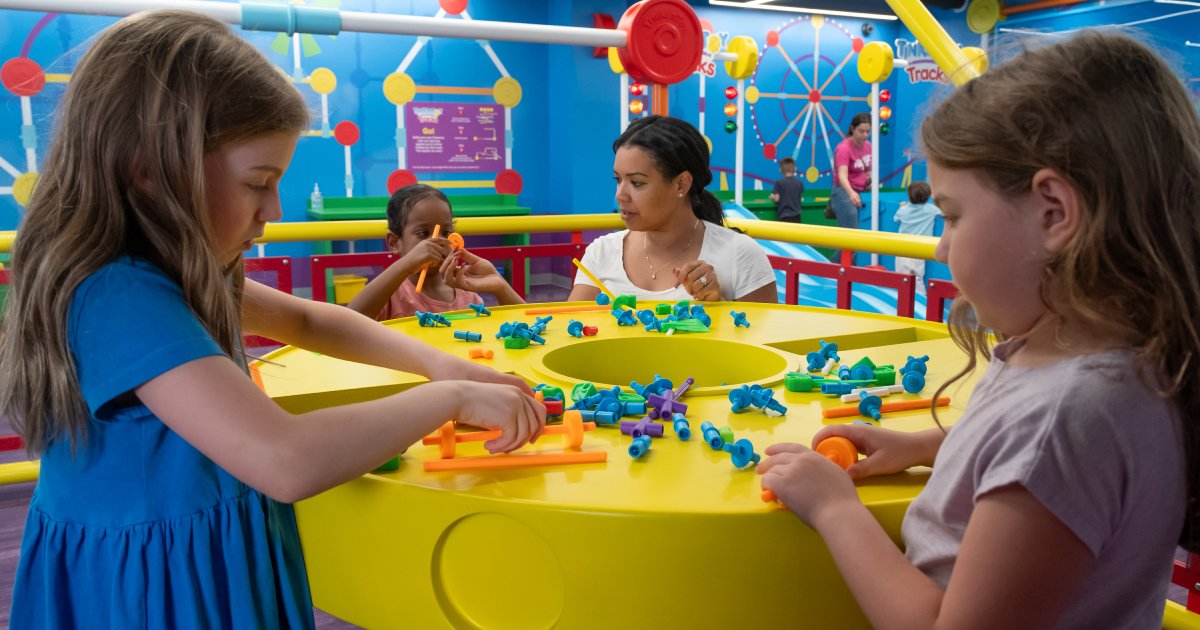How Brands Are Prioritizing LBE

By Mark Seavy
Location-based entertainment (LBE) has become a top priority as brand owners map their strategies for 2026 and beyond.
But the rise of LBE, which was front and center at Brand Licensing Europe in London last week, hasn’t come at the expense of other categories. This is in part because immersive experiences have created new opportunities to develop exclusive products tied to those specific locations. These opportunities are only expected to grow as the LBE landscape continues to expand with formats that range from stage shows to family entertainment centers to theme parks to pop-up retail experiences.
And with that variance has come more prominent positioning for immersive experiences in brand plans. In fact, the high potential for LBE means the category has worked its way into “greenlit” committee meetings that weigh plans for new properties and has provided earlier access to IP assets to aid in planning, according to Vince Klaseus, President of Universal Parks & Experiences. Universal plans to open a new 476-acre theme park in Bedfordshire, U.K. in 2031, marking its first incursion in Europe.
“We get early access to scripts, so we are really going in at the very ground level and evaluating the properties,” Klaseus said. “We have moved it [LBE] way up and it depends on the IP. Assuming it is a priority, we make those presentations and start the conversations.”
And while the November opening of Mattel Adventureland in Glendale, AZ has potentially been delayed, the toymaker recently saw licensee Wondr open a smaller Barbie: The Dreamhouse Experience in Amsterdam. The company has made LBE a key cog in the newly formed Mattel Studios, which sets the agenda for content, said Ruth Henriquez, EMEA Head of Licensing, Publishing, and LBE at Mattel.
But how these experiences are being handled varies, with larger companies having a dedicated LBE staff while smaller firms balance plans with existing executives against other priorities.
Crayola, for example, closed the Crayola Experience in Chandler, AZ in June—it was the first expansion of the format when it opened in 2019. Moving forward, Crayola (which has four other experience locations) is shifting to outbound licensing for these LBE efforts. It’s a move that will enable the company to “get further faster” with openings as part of a goal to open “dozens within the next couple of years,” said Kim Rompilla, Senior Vice President for Global Licensing at Crayola.
For its part, WildBrain CPLG has opened a branded store in China that features experiences tied to its Peanuts, Strawberry Shortcake, and Teletubbies properties, said CEO Maarten Weck, Executive Vice President of Global Partnerships and Licensing. WildBrain is planning a second location in the region.
“In smaller markets there can be pop-up brand activations and family entertainment centers that allow a brand to be tested to see whether people are connecting to it and how we might be able to scale it,” Weck said.
Yet scaling an LBE project can be an expensive endeavor with the building materials, transportation, and other costs weighing on plans for an experience, industry executives said. Those costs can result in companies charging high prices for tickets to the experience, and the margins are narrow, industry executives said.
“You always want something that is of the highest quality and very curated, and making that work from a ticket price point of view is tough,” said Andrew Carley, Director of Global Licensing at the BBC, which has created experiences inspired by series like Bluey and Hey Duggee. “With experiential, you must come to terms with setup costs that can be astronomical. And that offering to the public must be top notch because the experience and what it creates in the mind of the consumer can be very long-lasting. When categories like experiences start to gain momentum, lots of companies go into it thinking there is money that can be made. But the truth is it requires a lot of hard work.”
Many companies are adjusting their strategies to find a less expensive route within the realm of LBE, however.
BBC Studios, for example, licensed Disney Cruises this year in New Zealand, Australia, and the Caribbean for Bluey and Bingo character meet and greets and dance parties. Disney, which carries the Bluey series on its channels, pays a flat fee for the characters. Spin Master Corp., meanwhile, licensed retailer Miniso to create a section in 200 of its U.S. stores for DTR products, including apparel and toys tied to its mobile game Toca Boca World.
And Merchantwise has had a long-standing strategy of developing augmented reality trails, including an app with Magic Light Pictures for The Gruffalo Spotters Trail in the National Trust Currumbin Wildlife Sanctuary (NTCWS) in Currumbin, Australia. There are also trails at Scenic World in Aloomba, New South Wales and the Perth Zoo that pay a $30,000 annual flat fee. The parks are also licensed for character meet-and-greets and storytelling.
“Experiences are a natural fit for brands with a strong lifestyle equity and for those in the gaming space where you can take the virtual experience into a real world one, but you have to be sure it has longevity to be able to make money,” said Louise French, SVP of Business Development and Marketing at Beanstalk, whose client Diageo’s Guinness is opening an experience at its Open Gate Brewery in Covent Garden in London in November. “Experiences are definitely an area of growth and innovation, but they won’t work for every brand because they are complicated to execute and require significant investment. The ones that work will be those where consumers can really interact otherwise the experience is more akin to a museum. On top of that it is important to ensure that the experience will appeal to new as well as existing customers to ensure a constant flow through the door.”




